- Home
- James A. Michener
Tales of the South Pacific Page 2
Tales of the South Pacific Read online
Page 2
"I say! Grant!" A young flight officer, a New Zealander, had come ashore.
"Well, Colbourne! How are you?" The friends shook hands. We were glad to see that Colbourne was at least young and excitable. He was quite agitated as he took a drink of coffee in our mess hut.
"We won't come ashore," he said. "We must both go out at once. There is wretched news. The entire Jap southern fleet is bearing down upon us. You and I must go out for the last minute look-see. This may be the day, Grant. We've got to find where the carriers are. I have orders here. They didn't send them by wireless. But fellows! There's a chance! There really is! I understand Fitch and Kester are on the move. I don't know with what, but we're going to fight!" The young fellow's eyes sparkled. After the long wait, we would fight. After Pearl Harbor and Manila and Macassar and the Java Sea, we would go after them. After one string of crushing defeats upon another, the American fleet, such as it was, would have a crack at the Japs!
"What is happening at home?" Grant asked, apparently not moved by the news.
Colbourne swallowed once or twice. "They are waiting," he said grimly. "It has been pretty well worked out. The old men-well, your wife's father and mine, for example. They are stationed at the beaches. They know they dare not retreat. They have taken their positions now." He paused a moment and took a drink of our warm water. We waited.
"The home guard is next. They've been digging in furiously. They occupy prepared positions near the cities and the best beaches. The regular army will be thrown in as the fighting develops. Everyone has decided to fight until the end. The cities and villages will be destroyed." He paused and tapped his fingers nervously against his cup.
"Many families have already gone to the hills. Cars are waiting to take others at the first sign of the Jap fleet. My wife and the kiddies have gone. Your wife, Grant, said to tell you that she would stay until the last." Grant nodded his head slowly and said nothing. Colbourne continued, his voice sounding strange and excited in the hot, shadowy hut. We leaned forward, thinking of Seattle, and San Diego, and Woonsocket.
"The spirit of the people is very determined," Colbourne reported. "A frightful Japanese broadcast has steeled us for the worst. It came through two nights before I left. A Japanese professor was describing New Zealand and how it would be developed by the Japs. North Island will be a commercial center where Japanese ships will call regularly. South Island will be agricultural. Wool and mutton will be sent to Japan. Maoris, as true members of the Greater East Asia Coprosperity Sphere, will be allowed special privileges. White men will be used on the farms. The professor closed with a frenzied peroration. He said that the lush fields, the wealth, the cities were in their grasp at last. The day of reckoning with insolent New Zealanders was at hand. Immortal Japanese troops would know what to do!"
No one said anything. Grant looked at his wrist watch. "It's 0630," he said. "We'll be off." He started from the hut but stopped. "Aberforce," he asked, "will you handle the radio again?"
Aberforce, somewhat subdued, left the hut. Colbourne and Grant went down to the rubber rafts and were rowed to their planes. The newcomer was first to take off. He headed directly for the Canal. Then Grant taxied into free water. His propellers roared. Slowly the plane started along the smooth water. Then it raised to the step, like a duck scudding across a still pond. It poised on the step for a moment and became airborne. It did not circle the bay, but set out directly for the vast Coral Sea.
All day we waited for news. I helped to code and transmit the weather reports Aberforce should have been sending. About noon a cryptic message came through the radio. It was apparently Grant, using a new code. Later a plain-word message came from the south. It was true. The Jap fleet was heading for our islands!
I issued the last rounds of ammunition. We dug up the tiny transmitter and drew rough maps of the region we would head for. Reluctantly we decided that there would be no defense of the beach. Each of us studied the native boys suspiciously. What would they do when the Japs came? Would they help track us down?
At about four o'clock in the afternoon Colbourne's PBY came back. His radio was gone, so he rushed to our set and relayed a plain-code message to the fleet: "The Jap fleet has apparently formed. What looked like BB's steamed from Guadalcanal. Going westward. No carriers sighted. Little air cover over the BB's. But the fleet is forming!" He then continued with a coded description of exactly what he had seen. Before he finished, Grant's plane came in. It was smoking badly. The entire rear section seemed to be aflame. At first it seemed that Grant might make his landing all right. But at the last minute the crippled plane crashed into the sea. It stayed afloat for several minutes, at the mouth of the lagoon. In that time Grant, Aberforce, and four of the men escaped. The co-pilot was already dead from Jap fire. Two men drowned in the after compartments.
We pulled the survivors from the sea. Aberforce was pale with cold and fear, cold even in the tropics. Grant was silent and walked directly in to consult with Colbourne, who stopped broadcasting. They consulted their notes, compared probabilities and started all over again. It was now dusk. When the message was finished, Grant went down to the seaside with his crew and read once more the burial service. Aberforce stood beside him, terribly white.
That night we had a wretched scene at dinner. We didn't serve the meal until late, and as soon as we sat at table, Grant announced that tomorrow he would fly Colbourne's plane. To this Colbourne would not agree. Grant insisted primly that it was his right and duty, as senior officer. In the end Colbourne told him to go to hell. Grant had crashed his damned plane and wrecked it and now, by God, he wouldn't get the other one. The younger man stamped from the room. Grant started to appeal to us for a decision but thought better of it.
In the morning Colbourne and his crew set out. We never saw them again. They submitted only one report. "Entire Jap fleet heading south."
All day we sat by the radio. There was news, but we could make nothing of it. That some kind of action was taking place, we were sure. We posted extra lookouts in the trees. In midafternoon an American plane, an SBD, lost from its carrier, went wildly past our island. It crashed into the sea and sank immediately.
Two torpedo planes, also American, flashed past. Night came on. We did not eat a regular meal. The cook brought in sandwiches and we munched them. No one was hungry, but we were terribly nervous. As night wore on, we gave up trying to work the radio. We had long since surrendered it to Grant, who sat hunched by it, his hands covering his face, listening to whatever station he could get.
Finally, he found a strong New Zealand government transmitter. We stood by silently waiting for the news period. A musical program was interrupted. "It can now be stated that a great fleet action is in progress in the Coral Sea, between forces of the American Navy and the Japanese fleet. Elements of the Royal Australian Navy are also participating. It is too early to foretell what the outcome will be. Fantastic Japanese claims must be discounted. Word of the impending action came this morning when monitors picked up a message from a New Zealand Catalina which had sighted the enemy fleet." The broadcast droned on. "The nation has been placed on full alert. Men have taken their places. In this fateful hour New Zealanders pray for victory."
At this last Grant impatiently snapped off the radio and left the hut. Soon, however, he was back, hunched up as before. He stayed there all night and most of the next day. By this time we had fabricated another receiver. A wonderfully skilled enlisted man and I sat by it throughout the day. Heat was intense, and a heavy stickiness assailed us every time we moved. Once I looked up and saw Grant down by the shore, watching the empty sky. He walked back and forth. I stopped watching him when I heard the first real news we had so far received.
American fleet headquarters officially announced that the full weight of the Jap fleet had been intercepted. A battle was in progress. Our chances appeared to be satisfactory.
A wild shout from the other radio indicated that they had heard the broadcast, too. Immediately fantastic con
jecture started through the camp. At the noise Grant walked calmly into my hut. "What is the news?" he asked. I told him, and he left. But in a few minutes he was back and elbowed me away from the set. For the rest of that day and night he was there. Once or twice he drowsed off, but no one else touched the radio for sixteen hours.
At about 1900, after the sun had set, we heard two pilots talking back and forth. They were over the Coral Sea. They had lost their ship. Or their ship had been sunk. They encouraged one another for many minutes, and then we heard them no more.
At 0500 the next morning a coded message came through calling on all aircraft to be on the alert for Jap ships. This message goaded Grant furiously. He stomped from the hut and walked along the beach, looking at the spot where his PBY had gone down.
By now no one could talk or think. We had been three days in this state of oppressive excitement. Three of our men lay dead in the bay; an entire plane crew was lost. And we were perched on the end of an island, in the dark. We were not even doing our minimum duty, for our planes were gone. All we could do was sit and wonder. There was much discussion as to what the cryptic message about Jap ships meant. Could it be that the Japanese fleet had broken through? In anxiety we waited, and all about the silent jungle bore down upon us with heat, flies, sickness, and ominous silence.
At 1500 we intercepted a flash from Tokyo announcing our loss of the Lexington, two battleships, and numerous destroyers. So frantic were we for news that we believed. After all, we had heard those pilots. Their carrier could have been sunk. The news flashed through our camp and disheartened us further.
It was at 1735 that Grant finally picked up a strong New Zealand station. An organ was playing. But something in the air, some desperation of thought, kept everyone at Grant's elbow, crowding in upon him. Then came the fateful news: "Profound relief has been felt throughout New Zealand. Admiral Nimitz has announced that the Jap fleet has been met, extensively engaged, and routed." A fiery shout filled the hut. Men jumped and clapped their hands. The radio droned on: "... losses not authenticated. Our own losses were not negligible. Carrier aircraft played a dominant role. At a late hour today the Prime Minister announced that for the moment invasion of New Zealand has been prevented." Three Americans cheered wildly at this. The New Zealand men stood fast and listened. "... so we have taken the privilege of asking a chaplain of the Royal New Zealand Air Force to express our gratitude..." Grant was drumming on the radio with his fingers. He rose as the chaplain began to intone his prayer. Others who were seated followed his example. There, in the silence of the jungle, with heat dripping from the walls of the improvised hut, we stood at attention. "... and for these divine blessings our Nation and its free people..." One by one men left the hut. Then it began to dawn upon them that the waiting was over. Someone began to shout to a sentry up in the tree.
In disbelief he shouted back. Soon the land about the bay was echoing with wild shouts. One young officer whipped out his revolver and fired six salutes in violent order. Natives ran up, and the cook grabbed one by the shoulders. He danced up and down, and the native looked at him in wonderment. In similar bewilderment, two New Zealand enlisted men-beardless boys-who had escaped from Grant's wrecked plane, looked over the waters and wept.
Grant himself disappeared right after the broadcast. Others hung about the radio and picked up further wonderful news. Commentators were already naming it the Battle of the Coral Sea. From Australia one man threw caution far aside and claimed, "For us it will be one of the decisive battles of the world. It proves that Japan can be stopped. It proves that we shall be saved."
Grant was late coming in to chow. When he appeared, he was neatly washed and shaved. His hair was combed. In his right hand he held, half hidden behind his leg, a bottle. "Gentlemen," he said courteously, "I have been saving this for such an occasion. Will you do me the honor?" With courtly grace he presented the bottle to me and took his seat.
I looked at the label and whistled. "It's Scotch, fellows!" I reported. "It's a fine thing for a night like tonight!" I opened the bottle and passed it to the man on my right.
"After you, sir," that officer said, so I poured myself a drink. Then the bottle passed and ended up before Grant. He poured himself a stiff portion.
"I believe a toast is in order," an American officer said. We stood and he proposed, "To an allied victory." Americans and New Zealanders congratulated him on the felicity of his thought. Another American jumped to his feet immediately.
"To the men who won the victory!" he said in a voice filled with emotion. No one could censure his extremely bad taste. We knew it was unseemly to be drinking when Colbourne, Grant's fellow pilot, and so many men were missing, but we had to excuse the speaker. It was Ensign Aberforce. After that display no more toasts were given.
Instead we sat around the hut and talked about what we thought had happened, and what would happen next. It might be months before we were taken off Vanicoro. Through all our discussions Grant sat silent. He was, however, drinking vigorously. From time to time someone would report upon late radio news, but since it was favorable news, and since one doesn't get whiskey very often on Vanicoro, we stayed about the table.
At about 2300 the radio operator got a Jap broadcast which he turned up loud. "The American fleet is in utter flight. The American Navy has now been reduced to a fifth-rate naval power. Our forces are regrouping." At that last admission everyone in the room cheered.
It was then that Grant rose to his feet. He started to speak. Surprised, we stopped to listen. We knew he was drunk, but not how drunk. "Today," he began in a thick voice. "Today will undoubtedly be remembered for years to come. As the gentleman from Australia so properly observed, this was one of the decis-..." He stumbled badly over the word and dropped his sentence there.
"If you have not been to New Zealand," he began, and then lost that sentence, too. "If you were a New Zealander," he started over with a rush, "you would know what this means." He took a deep breath and began speaking very slowly, emphasizing each word. "We were ready to protect the land with all our energy..." His voice trailed off. We looked at one another uneasily. "From the oldest man to the youngest boy we would have fought. It was my humble duty to assist in preparing the defenses of Auckland. I issued several thousand picks, crowbars, and axes. There were no other weapons." He reached for his whiskey and took a long, slow drink.
"My own wife," he resumed, "was given the job of mobilizing the women. I urged her to go to the hills..." He fumbled with his glass. "In fact, I ordered her to go, but she said that our two children..." He paused. It seemed as if his voice might break. A fellow New Zealander interrupted.
"I say, Grant!"
Leftenant Grant stared at his subaltern coldly and continued: "There are some of us in New Zealand who know the Japs. We know their cold and cunning ways. We know their thirst for what they call revenge." His voice grew louder, and he beat the table. "I tell you, we know what we have escaped. A heel of tyranny worse than any English nation has known!" He shouted this and upset his glass. Two officers tried to make him sit down, but he refused. He upset another glass defending himself from his friends. We wanted to look aside but were fascinated by the scene. Grant continued his speech.
"Gentlemen!" he said with a gravity one might use in addressing Parliament. "Especially you gentlemen from our wonderful ally. I pray to God that never in your history will you have an enemy... will you have an enemy so near your shores!" He paused and his voice took on a solemn ring as if he were in church. His drunkenness made the combined effect ridiculous. "I pray you may never have to rely upon a shield like this." He surveyed the tiny shack and our inadequate materials. We followed his eyes about the wretched place. The radio that was pieced together. The improvised table. The thin pile of ammunition. Grant's voice raised to a shout. "A shield like this!" he cried. He exploded the word this and swept his right arm about to indicate all of Vanicoro. As he did so, he lost his balance. He grabbed at a fellow officer. Missing that support, he
fell upon the table and slipped off onto the floor. He was unconscious. Dead drunk.
MUTINY
WHEN I returned to Noumea from the island of Vanicoro, Admiral Kester called me into his office. He had one of the rooms near the gingerbread balcony on Rue General Gallieni. He said, "We were lucky at Coral Sea. It's the next battle that counts." He waved his hand over the islands. His finger came to rest, I remember, on a large island shaped like a kidney, Guadalcanal.
"Some day we'll go into one of those islands. When we do, we've got to have a steady flow of planes from New Zealand and Australia. Now look!" Spreading his fingers wide he dragged them down the map from Bougainvillea, New Georgia, and Guadal. He brought them together at Santo. "We have Santo. We'll keep it. It's the key. And we can supply Santo from Noumea. But if we ever need planes in an emergency, we must be able to fly them up to Noumea from New Zealand and Australia." He slashed his thumb boldly from Guadal-canal to Auckland. "That's the life line.
"Now if you'll look at the air route from Noumea to Auckland you'll see a speck in the ocean not far from the route from Australia to Noumea. That speck's an island. It's vital. Absolutely vital!" His chin jutted out. His stubby forefinger stabbed at the map. The vital speck was Norfolk Island.
There is no other island in the South Pacific like Norfolk. Lonely and lost, it is the only island in the entire ocean where no men lived before the white man came. Surrounded by gaunt cliffs, beat upon endlessly by the vast ocean, it is a speck under the forefinger of God, or Admiral Kester.
"You'll find some Americans down there," the admiral continued. "Building an airstrip. They're bogged down. Look." He handed me a dispatch from Norfolk: "TWO SITES CHOSEN X OPPOSITION TO BETTER SITE TERRIFIC X CAN WE IGNORE LOCAL WISHES X ADVISE X TONY FRY X."

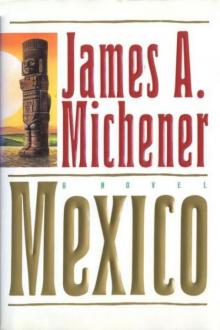 Mexico
Mexico The World Is My Home: A Memoir
The World Is My Home: A Memoir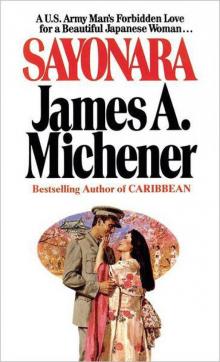 Sayonara
Sayonara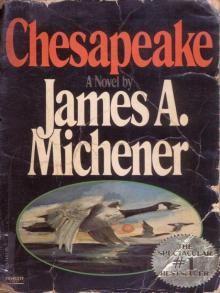 Chesapeake
Chesapeake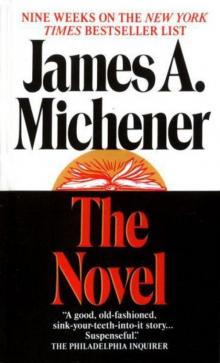 The Novel
The Novel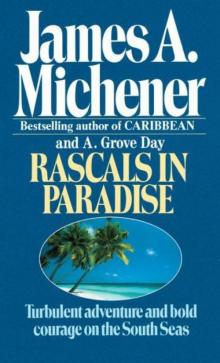 Rascals in Paradise
Rascals in Paradise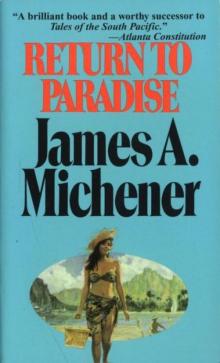 Return to Paradise
Return to Paradise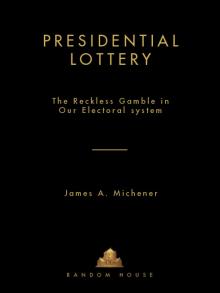 Presidential Lottery: The Reckless Gamble in Our Electoral System
Presidential Lottery: The Reckless Gamble in Our Electoral System The Source
The Source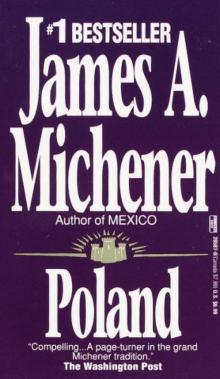 Poland
Poland Space
Space Caravans
Caravans Creatures of the Kingdom: Stories of Animals and Nature
Creatures of the Kingdom: Stories of Animals and Nature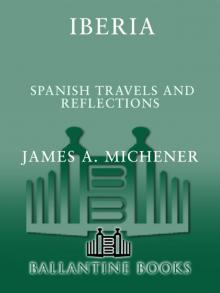 Iberia
Iberia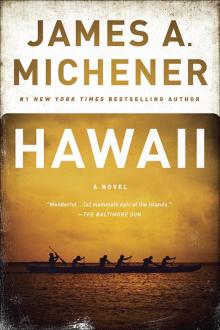 Hawaii
Hawaii The Watermen: Selections From Chesapeake
The Watermen: Selections From Chesapeake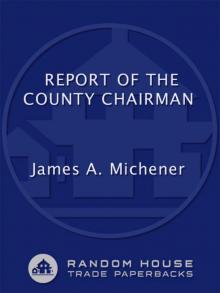 Report of the County Chairman
Report of the County Chairman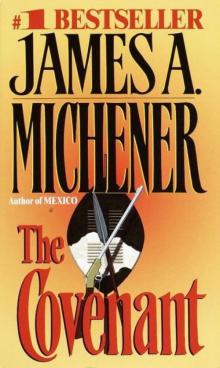 The Covenant
The Covenant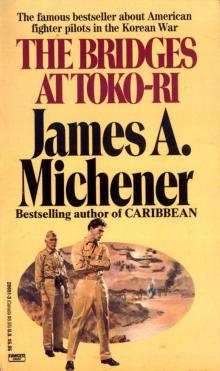 The Bridges at Toko-ri
The Bridges at Toko-ri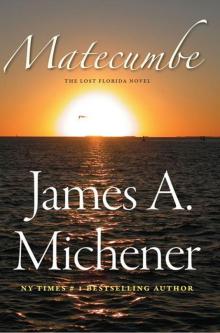 Matecumbe
Matecumbe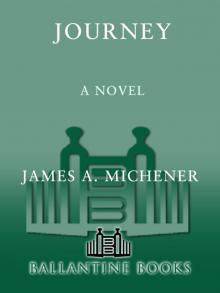 Journey: A Novel
Journey: A Novel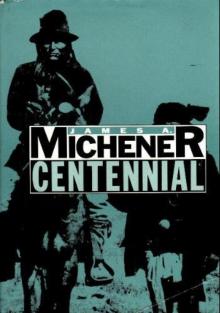 Centennial
Centennial Sports in America
Sports in America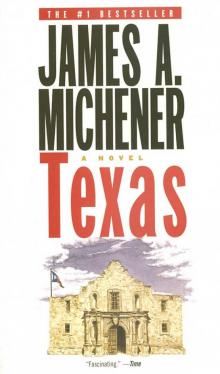 Texas
Texas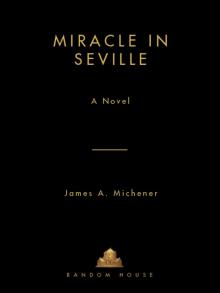 Miracle in Seville
Miracle in Seville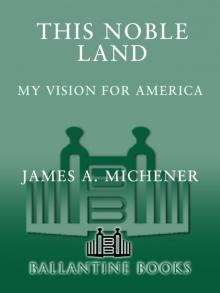 This Noble Land: My Vision for America
This Noble Land: My Vision for America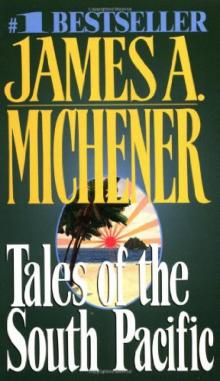 Tales of the South Pacific
Tales of the South Pacific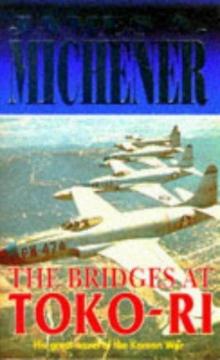 Bridges at Toko-Ri
Bridges at Toko-Ri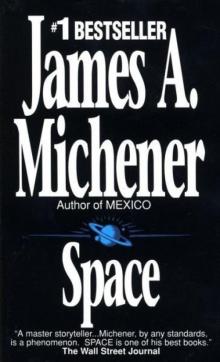 Space: A Novel
Space: A Novel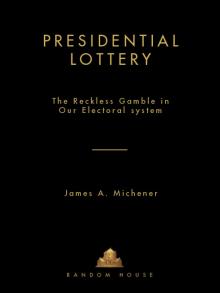 Presidential Lottery
Presidential Lottery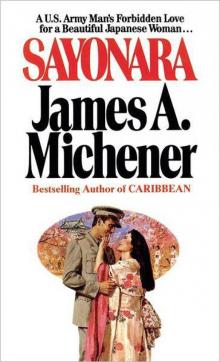 Sayonara: A Novel
Sayonara: A Novel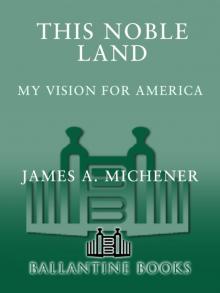 This Noble Land
This Noble Land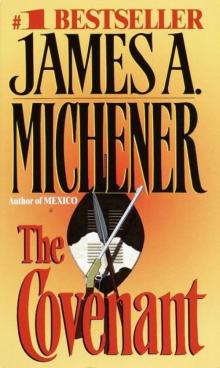 The Covenant: A Novel
The Covenant: A Novel Miracle in Seville: A Novel
Miracle in Seville: A Novel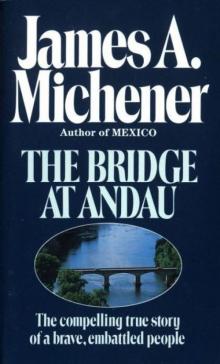 The Bridge at Andau
The Bridge at Andau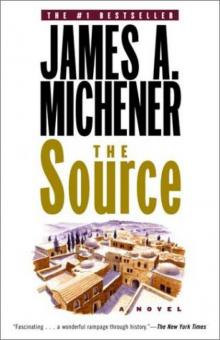 Source
Source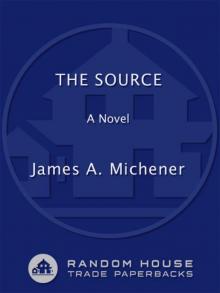 The Source: A Novel
The Source: A Novel Journey
Journey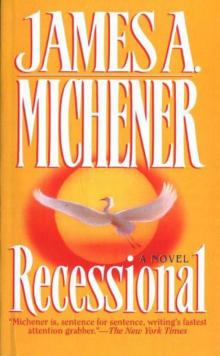 Recessional: A Novel
Recessional: A Novel Legacy: A Novel
Legacy: A Novel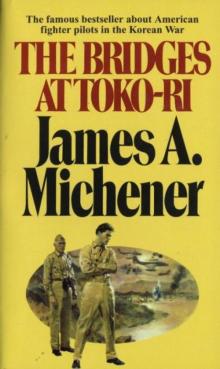 The Bridges at Toko-Ri: A Novel
The Bridges at Toko-Ri: A Novel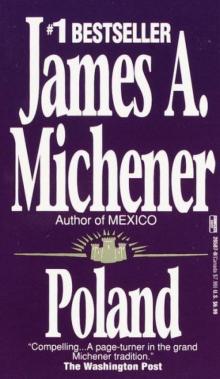 Poland: A Novel
Poland: A Novel